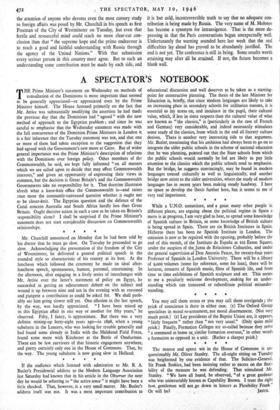If the audience which listened with admiration to Mr. R.
A. Butler's Presidential address to the Modern Language Association last Saturday had known that in his article in the Observer the next day he would be referring to " the active tense " it might have been a little shocked. That, however, is a very small matter. Mr. Butler's address itself was not. It was a most important contribution to educational discussion and well deserves to be taken as a starting- point for constructive planning. The thesis of the late Minister for Education is, briefly, that since modern languages are likely to take an increasing place in secondary schools for utilitarian reasons, it is essential to lay stress on, and inculcate in the pupil, their cultural value, which, if less in some respects than the cultural value of what are known as " the classics," is (particularly in the case of French and German) very considerable, and indeed necessarily stimulates some study of the classics, from which in the end all literary culture derives. There is another very interesting side to that argument. Mr. Butler, mentioning that his ambition had always been to go on to integrate the older public schools in the scheme of national education that he was planning, pointed out that the State schools from which the public schools would. normally be fed are likely to pay little attention to the classics which the public schools tend to emphasise. But the bridge, he suggests convincingly, may be found in modern languages treated culturally as well as linguistically, and another bridge now exists to the older universities, where the study of modern languages has in recent years been making steady headway. I have no space to develop the 'thesis further here, but it seems to me of very real importance.
* * * *


























 Previous page
Previous page